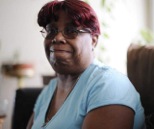Thursday April 24, 2014 Easter Thursday
“I massaged (Utash’s) neck, and got his circulation going.”
Deborah Hughes
“I looked out the window and saw that the boy had been hit, so I threw on my coat and ran out there,” said Hughes, who is retired from the St. James Nursing Center in Detroit. Hughes also made sure to pack her .38 caliber pistol. “You have to carry a gun around here,” she said. “This neighborhood is terrible. I don’t walk around without my gun. “I saw the boy all by himself, crying,” Hughes said. “His father was in the store. He came out, and I told him, ‘I’m a nurse; don’t touch him. Let him lay there.’ The baby was crying so hard, and I talked to him and tried to calm him down.
“About that time, I saw (Utash) get out of his truck; he came running up saying, ‘Oh, my God, tell me he’s all right. Please tell me he’s all right.’ He was hysterical.” The crowd that had gathered suddenly attacked Utash, Hughes said. “He was screaming, and they were beating him, and kicking him,” she said. “I said ‘Please don’t hit him anymore,’ and they backed up. Everybody cleared the way and gave me room to work on him. Nobody cussed me; they didn’t attack me. They just let me do what I needed to do.
“I massaged (Utash’s) neck, and got his circulation going. He woke up and started swinging and kicking. By this time, the EMS came, and me and the EMS driver tied him down and put him in the ambulance.”
Hughes shrugged off claims that she’s a hero. “You just have to do the right thing,” she said. {Detroit News April 8, 2014}
In this urban moment, the lives of Steven Utash, some angry young men, and a retired nurse who live on that street intersected. Two weeks later their intersection unfolds as larger than themselves; their moment has become a moment asking for the attention of the city and its metropolitan area. UDM, by our research and teacher-student conversations is about the business of paying attention to the human condition, and understanding events from a range of perspectives. The poet Denise Levertov offers one in her hard-edged poem, “Making Peace.” It helps to read a poem out loud. And more than once.
Weather.com says more clouds than sun today, April showers (that bring the flowers that bloom in May) much of Friday, peeks at the sun later in the day.
Blessings on us employees and on our students during finals week.
John st sj
Making Peace
A voice from the dark called out,
`The poets must give us
imagination of peace, to oust the intense, familiar
imagination of disaster. Peace, not only
the absence of war.’
But peace, like a poem
is not there ahead of itself,
can’t be imagined before it is made,
can’t be known except
in the words of its making,
grammar of justice
syntax of mutual aid.
A feeling towards it,
dimly sensing a rhythm, is all we have
until we begin to utter its metaphors,
learning them as we speak.
A line of peace might appear
if we restructured the sentence our lives are making,
revoked its reaffirmation of profit and power
questioned our needs, allowed
long pauses . . .
A cadence of peace might balance its weight
on that different fulcrum; peace, a presence,
an energy field more intense than war,
might pulse then,
stanza by stanza into the world,
each act of living
one of its words, each word
a vibration of light–facets
of the forming chrystal.
Denise Levertov “Breathing the Water”
“I massaged (Utash’s) neck, and got his circulation going.”
Deborah Hughes

